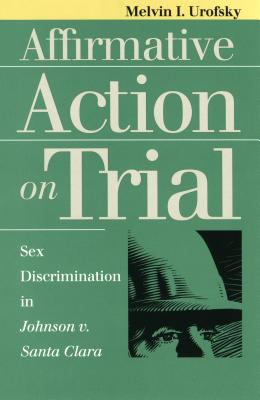
Book Specs
Binding
Trade Paper
Publisher
University Press of Kansas
Published on
Apr 29, 1997
Edition
st Edition
Dimensions
5.55x0.57x8.52 Inches
Weight
0.73 Pounds
About the Book
Affirmative action continues to be one of the most hotly contested issues in America. Volatile and divisive, the debates over its legitimacy have inspired a number of "reverse discrimination" suits in the federal courts. Like the landmark 1978 Bakke decision, most of these have focused on preferential treatment given racial minorities. In Johnson v. Santa Clara, however, the central issue was gender, not race discrimination, and the Supreme Court's decision in that case marked a resounding victory for women in the work force.
Johnson v. Santa Clara involved two people who in 1980 competed for a dispatcher position with the transportation department of Santa Clara County, California. Paul Johnson had more experience and slightly higher test scores, but Diane Joyce was given the job based on affirmative action. An irate Johnson sued the county and won, only to have the decision reversed in appellate court. That reversal was subsequently upheld in the Supreme Court's 1987 decision, reaffirming that it was legitimate for employers to consider gender in hiring.
Preeminent legal historian Melvin Urofsky proves an exemplary guide through the complexities of this case as he takes us from the workplace through the various levels of our federal court system. Balancing the particulars of the case with an overview of constitutional law and judicial process, he creates a model legal history that is both appealing and enlightening for the non-scholar. Urofsky is especially good at highlighting the fundamental human drama of this case and shows how Johnson and Joyce were simply ordinary people, each with valid reasons for their actions, but both ultimately caught up in legal and social issues that reached well beyond their own lives.
Affirmative Action on Trial pointedly addresses the issue of sex discrimination and the broader controversy over the place of affirmative action in American society. The latter continues to generate headlines, like those that followed the 1996 Supreme Court decision to let stand a lower-court ruling that race cannot be used as a determination for admission to academic programs. More recently, several states have even taken steps to end affirmative action altogether. While it's hard to tell how such actions will ultimately impact affirmative action, there's no question that the rulings in cases like Johnson v. Santa Clara will continue to guide and influence the debates both inside and outside the courtroom.
